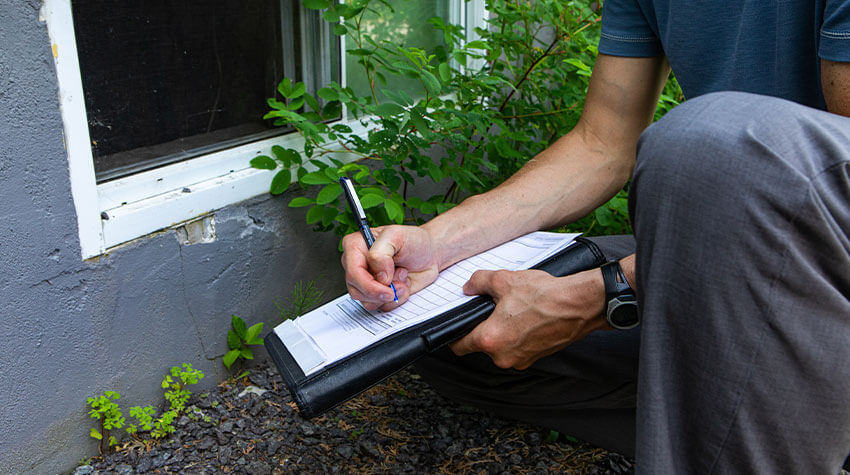Even if you've found what seems to be the perfect home, you need to find a home inspector to cast a critical and experienced eye on every aspect of the property. Only then will you understand the true condition – and true value – of the property.
It doesn't just apply to older homes. Even new construction homes can have flaws that need correction. A professional home inspection will provide peace of mind to you, and ensure that your home investment is a wise one.
Should All Real Estate be Inspected?
Absolutely. While most lenders require a home inspection, it only makes sense to have an expert go over any new property you purchase.
When real estate is sold "as is" or as a "fixer-upper," a home inspection can give you a "heads up" on whether the property's needs are greater than its worth. Older properties need close inspection simply because of the ravages of time; however, even new homes may harbor hidden structural or mechanical defects that could turn you new purchase into a nightmare.
Generally, buyers assume the cost when they request an inspection. Often the only problems uncovered are minor cosmetic flaws or defects that are easily repaired or corrected. In the event major defects are discovered, a professional home inspection could save thousands of dollars and provide documentation for property price reductions or other concessions.
What Can I Expect from a Home Inspection?
Your Home Inspection will help you understand whether a home's sale price is a true indicator of its worth, at least from the standpoint of structural soundness. It takes much of the guesswork out of the purchase, protecting both buyer and seller. While most Home Inspections fail to turn up any major property defects, there are a few things any new real estate purchaser should watch out for.
According to the California Real Estate Inspection Association, some of the most common major defects discovered during home inspections are:
- Roofing defects due to aging, wear, or improper installation.
- Ceiling stains indicating past or present roof leaks.
- Evidence of flooding in basements and/or crawlspaces.
- Electrical hazards.
- Rotted wood on the exterior or around plumbing.
- Building code violations.
- Fireplace and chimney hazards.
- Improper gas heating system/gas water heater installation.
- Very few home inspections result in a completely positive report. Over time, wear and tear often creates the need for some kind of repair. If any element of a home fails inspection, it doesn't mean that the home itself is "bad", but that some aspect of it needs correction.
Typically, sellers will agree to make major repairs prior to sale. Just as often, seller will buy a home with full knowledge of minor flaws, and make the repairs later, either as needed, or as part of a more expansive renovation.
Finding a Qualified Home Inspector
Since most states do not regulate home inspections – or home inspectors – it's best to get advice from a professional real estate agent or local Board of Realtors to be sure you get a bona fide qualified professional. Most real estate agents will recommend several inspectors for you to choose from.
Here's some key advice for picking a Home Inspector:
- Look for someone who is a member of the American Society of Home Inspectors or National Association of Home Inspectors. Both organizations hold members to standards of practice and a professional code of ethics.
- Make sure your home inspector is insured. Only the most established inspectors carry Errors and Omissions liability insurance, which is difficult to qualify for, and expensive. It protects both the inspector and you.
- Trust your instincts. If you do not feel comfortable with a prospective inspector, look elsewhere.
- Beware just picking someone off the Internet. Since their inspection may well be the clincher in your house deal, you want to be sure that the inspector you choose is a qualified professional.
- Your home inspection is one of the final steps in purchasing your home, and one of the most important in guaranteeing its livability in the years to come. Don't rush through the process, or hire just anyone.
Pre-Listing Home Inspection for Sellers
You may wish to take a proactive approach to selling your home and have it inspected when you put it on the market. This allows you to prepare for issues a buyer might find and make repairs that could affect property negotiations.
A professional home inspection report by a credentialed inspector is also a marketing tool in your effort to find prospective buyers. Even if a later inspection reveals defects in your home, the preliminary seller home inspection from a credentialed professional is proof that you have nothing to hide.
If you do have your home inspected before you list it, you may find defects you were previously unaware of. If so, it's likely that you are legally responsible to disclose the presence of these defects to potential buyers.
Consult with an attorney about any applicable laws relating to disclosure of pre-listing inspection results.
Sellers should understand that buyers will likely want another inspection to occur before purchase, by a home inspector they select. Sellers shouldn't be offended if a potential buyer wants a second opinion – its best that both sides fully appreciate the soundness of the home before the contracts are signed.
Preparing for a Home Inspection
You should prepare for a home inspection carefully, repairing all known defects ahead of time, and clearing access for the inspector to all parts of the home. The cleaning and possible repair work you do will not only will facilitate the inspection, it will improve your home's marketability.
Before the inspector arrives, be sure to:
- Repair cracked or broken masonry
- Clear access to the basement, attic, electrical control panels, and major home systems for the inspector
- Replace broken glass and grouting around windows and doors
- Fix leaky faucets
- Make sure toilets flush properly
- Replace rotted wood around plumbing, doors, and windows
- Make sure electric outlets are active and replace cracked outlet covers
- Replace furnace filters and clean vents
- Check the roof for loose shingles and sagging gutters
- Paint rooms that need it
- Clean the oven and replace burner drip pans, if needed
- If you have already moved, make sure utilities will be turned on during the inspection
- Make a file of utility records, warranties, and receipts for major repairs
- Keep all pets and small children safely away during the inspection
- If you are the seller, make yourself available to the home inspector, but don't look over their shoulder. If they have questions, answer them truthfully, and don't take their commentary on the home as a personal criticism.
- The Home Inspector is there to act as a professional, and you should treat them in a professional and courteous manner.
What Do I Ask a Prospective Home Inspector?
When you talk with a prospective home inspector, always check his or her credentials but also clarify what you expect from that person.
Home inspection associations recommend that you ask the following questions when you retain a home inspector:
- What kind of training and credentials do you have?
- How long have you been in this business?
- Are you affiliated with any real estate agencies or local construction businesses? (conflict of interest.)
- Do you receive or give referral fees? (objectivity)
- Can you provide an advance list of areas to be inspected?
- Do you provide a detailed written report of all defects and recommendations for corrective measures?
- How much do you charge?
- Are there additional charges for certain tests?
- Can you provide recent references?
- No professional home inspector will object to these questions. If someone is reluctant, hire someone who you know you can work with.

